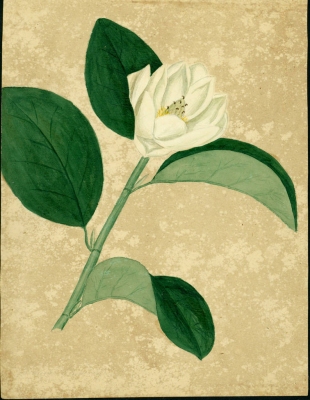Magnolia portoricensis
Bello
Magnoliaceae
Results of DNA analysis in various studies (see, for example, R.B. Figlar & H.P. Nooteboom, Blumea 49: 87-100. 2004) have supported the concept that the various genera comprising the subfamily Magnolioideae would be more consistently treated as a single genus, Magnolia. This is the treatment followed here, though it is still not universally accepted[
K- Title
- Plants for a Future
- Author
- Ken Fern
- Description
- Notes from observations, tasting etc at Plants For A Future and on field trips.
].
Common Name:
General Information
Magnolia portoricensis is an evergreen tree with a narrow crown; it can grow up to 21 metres tall. The bole can be up to 90cm in diameter[
447- Title
- Common Trees of Puerto Rico and the Virgin Islands
- Publication
-
- Author
- Little E.L.; Wadsworth F.H.
- Publisher
- USDA, Forest Service; Washington.
- Year
- 1964
- ISBN
-
- Description
- Contains detailed information, and usually an illustration, on 250 tree species, including both native and exotic species.
].
The tree produces a good quality wood, which is harvested from the wild for local use.
Known Hazards
None known
Botanical References
Range
Caribbean - Puerto Rico.
Habitat
Forests[
447- Title
- Common Trees of Puerto Rico and the Virgin Islands
- Publication
-
- Author
- Little E.L.; Wadsworth F.H.
- Publisher
- USDA, Forest Service; Washington.
- Year
- 1964
- ISBN
-
- Description
- Contains detailed information, and usually an illustration, on 250 tree species, including both native and exotic species.
].
Properties
| Other Uses Rating |      |
| Habit | Evergreen Tree |
| Height | 15.00 m |
| Cultivation Status | Wild |
Cultivation Details
The plant can flower and produce fruit nearly all year round[
447- Title
- Common Trees of Puerto Rico and the Virgin Islands
- Publication
-
- Author
- Little E.L.; Wadsworth F.H.
- Publisher
- USDA, Forest Service; Washington.
- Year
- 1964
- ISBN
-
- Description
- Contains detailed information, and usually an illustration, on 250 tree species, including both native and exotic species.
].
Edible Uses
None known
Medicinal
None known
Other Uses
The heartwood when freshly cut is olive brown or yellowish green, later becoming brown; the sapwood is light brown. The wood is hard, heavy, fine-textured, and spicy fragrant, and is susceptible to attack by dry-wood termites. It is used for making furniture, cabinetwork, and similar purposes[
447- Title
- Common Trees of Puerto Rico and the Virgin Islands
- Publication
-
- Author
- Little E.L.; Wadsworth F.H.
- Publisher
- USDA, Forest Service; Washington.
- Year
- 1964
- ISBN
-
- Description
- Contains detailed information, and usually an illustration, on 250 tree species, including both native and exotic species.
].
We do not have any more information on the wood of this species, but a general description of the wood for members of this genus growing in Central America and the Caribbean is as follows:-
The heartwood is olive-green when freshly cut, becoming light yellowish-brown to greenish-brown sometimes with a purplish tinge upon exposure, purple, dark brown, or nearly black streaks are common; the wide band of sapwood is white to greenish when first cut, darkening somewhat on exposure. The texture is fine and uniform; the grain straight to interlocked; lustre is low to moderate; there is no distinctive odour or taste. The heartwood is rated durable to highly durable with respect to deterioration by both white-rot and brown-rot fungi, but vulnerable to dry-wood termite attack. The wood is easy to air season, drying rapidly with no or slight warp and checking. It saws and machines easily, however in planing there may be considerable tearing where grain is irregular. It is used for utility veneer and plywood, millwork, furniture and cabinet work, general interior and exterior construction, boat planking, and turnery[
316- Title
- Tropical Timbers of the World. Ag. Handbook No. 607.
- Publication
-
- Author
- Chudnoff. Martin.
- Publisher
- USDA Forest Service. Wisconsin.
- Year
- 1984
- ISBN
-
- Description
- Terse details on the properties of the wood of almost 400 species of trees from the Tropics.
].
Propagation
Seed -
If you have any useful information about this plant, please leave a comment. Comments have to be approved before they are shown here.

 Useful Tropical Plants Database 2014 by
Ken Fern,
web interface by
Ajna Fern
with help from
Richard Morris.
Useful Tropical Plants Database 2014 by
Ken Fern,
web interface by
Ajna Fern
with help from
Richard Morris.